Ad Blocker Detected
Our website is made possible by displaying online advertisements to our visitors. Please consider supporting us by disabling your ad blocker.
Are you looking to maximize your muscle gains? A well-planned muscle building diet can be the key to achieving your goals. By fueling your body with the right nutrients and following a balanced meal plan, you can enhance muscle growth and get closer to your ideal physique.
When it comes to building muscle, nutrition plays a vital role. Your diet should be designed with foods that are high in protein, moderate in carbohydrates and fats, and packed with essential nutrients. This combination provides the necessary building blocks for muscle repair, growth, and overall health.
Pairing your muscle building diet with a consistent exercise routine is crucial. Physical activity challenges and stimulates your muscles, while the proper nutrition supports their development. Together, these two components work harmoniously to optimize muscle gain.
Key Takeaways:
- Optimizing muscle gains requires a well-planned muscle building diet.
- A balanced meal plan consisting of protein, carbohydrates, and fats is essential for muscle growth.
- Combine your diet with a consistent exercise routine for optimal results.
- Proper nutrition provides the necessary building blocks for muscle repair and growth.
- Consult with a healthcare professional or registered dietitian for personalized guidance.
Importance of Nutrition and Physical Activity for Muscle Gain
Both nutrition and physical activity are vital for achieving your muscle building goals. While exercise challenges and stimulates your muscles, proper nutrition provides the necessary nutrients, energy, and building blocks for muscle growth. By following a balanced diet that includes muscle-building foods and incorporating regular exercise into your routine, you can optimize muscle gain and build lean muscle mass.
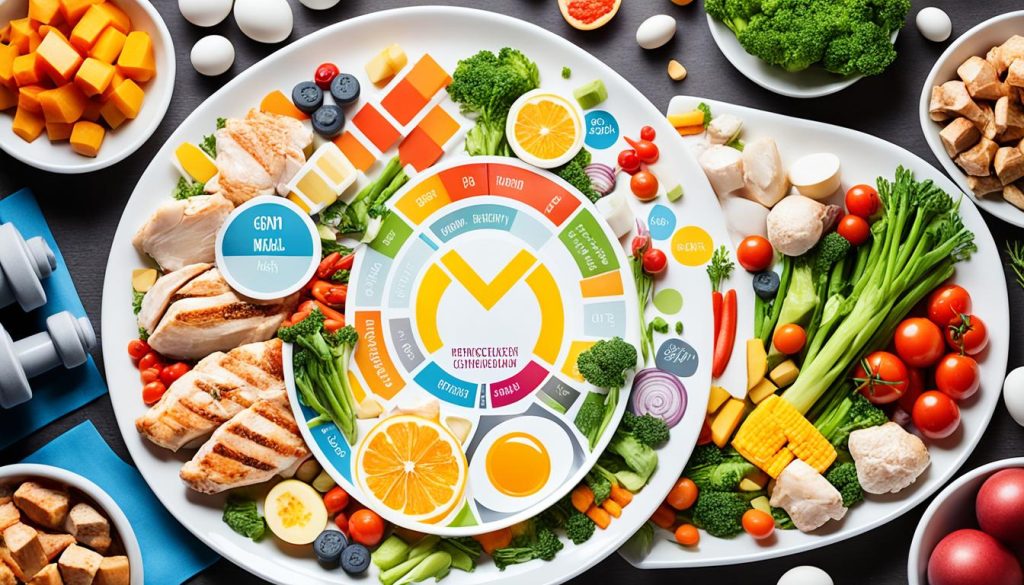
The Role of Nutrition in Muscle Building
Your diet plays a crucial role in supporting muscle growth. It’s important to consume adequate amounts of protein, carbohydrates, and fats to provide your muscles with the necessary nutrients for repair and growth. Protein, in particular, is essential for building and repairing muscle tissue. It’s recommended to consume around 1 gram of protein per pound of body weight to support muscle development. Additionally, carbohydrates provide the energy required for intense workouts, while healthy fats are important for hormone production and overall health.
Proper nutrition provides the necessary nutrients, energy, and building blocks for muscle growth.
The Impact of Physical Activity
Regular physical activity is equally important for muscle gain. Engaging in muscle building exercises, such as resistance training and weightlifting, helps stimulate muscle growth and increase strength. These exercises create micro-tears in the muscle fibers, which then repair and grow stronger during the recovery process. Incorporating a variety of exercises that target different muscle groups can help ensure balanced muscle development.
It’s important to note that rest and recovery are also crucial for muscle growth. Allowing your muscles enough time to rest and repair between workouts is essential for optimal results.
Creating a Balanced Approach
To maximize muscle gain, it’s crucial to merge proper nutrition with regular exercise. A well-rounded approach should include:
- A muscle-building diet that includes lean sources of protein, whole grains, fruits, vegetables, and healthy fats.
- Consistent resistance training and weightlifting exercises targeting different muscle groups.
- Adequate rest and recovery time to allow muscles to repair and grow.
By following this balanced approach, you can optimize your muscle-building journey and achieve the desired results.
Muscle Building Foods for Gaining Lean Muscle
When it comes to gaining lean muscle, nutrition is key. Fueling your body with the right foods can provide the essential nutrients and energy needed for muscle growth and repair. Here are some of the best muscle building foods that should be a part of your diet:
| Food | Protein Content (per 100g) |
|---|---|
| Eggs | 13g |
| Salmon | 22g |
| Chicken Breast | 31g |
| Greek Yogurt | 10g |
| Tuna | 30g |
| Lean Beef | 26g |
| Shrimp | 24g |
| Soybeans | 36g |
| Cottage Cheese | 11g |
| Turkey Breast | 29g |
These muscle building foods are not only high in protein, but also contain other important nutrients like vitamins and minerals that support muscle health. Incorporating these foods into your diet can help optimize your muscle building efforts.
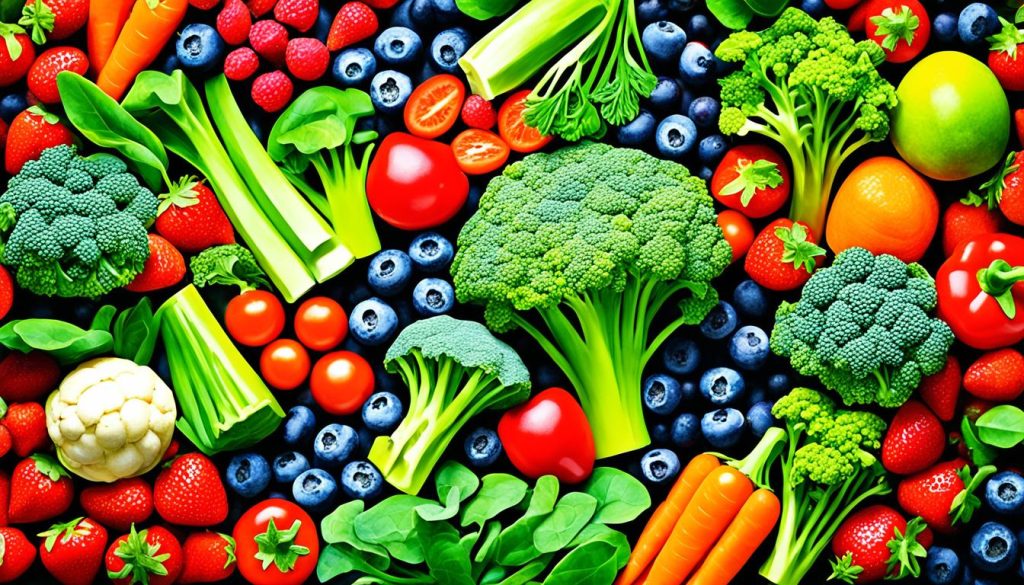
Why Protein is Essential for Muscle Gain
Protein is an important macronutrient for muscle growth and repair. It provides the necessary amino acids that make up the building blocks of muscles. Consuming an adequate amount of protein supports protein synthesis, which is crucial for muscle development. Aim to include protein-rich foods in every meal and snack to ensure you’re meeting your daily protein needs.
The Role of Macronutrients in Muscle Building
Macronutrients play a crucial role in muscle building. By understanding the importance of protein, carbohydrates, and fats, you can optimize your muscle gain journey. Each macronutrient serves a specific purpose in supporting muscle growth and overall health.
Protein for Muscle Gain
Protein is the building block of muscles and is essential for muscle repair and growth. It provides the necessary amino acids needed to recover from intense workouts and stimulate muscle protein synthesis. Including high-quality protein sources in your diet, such as lean meats, poultry, fish, dairy products, and plant-based proteins, can help you achieve your muscle building goals.
Carbohydrates for Energy
Carbohydrates are the primary source of energy for intense workouts. They fuel your muscles during exercise and prevent muscle fatigue. Including complex carbohydrates like whole grains, fruits, and vegetables in your diet can provide sustained energy for your workouts and support muscle building.
Fats for Muscle Building
Fats play a vital role in hormone production, which influences muscle growth, recovery, and overall health. Consuming healthy fats from sources like avocados, nuts, seeds, and olive oil can provide essential fatty acids and support hormone balance. Including these fats in your diet can optimize muscle building and promote overall well-being.
It is important to maintain a balanced ratio of macronutrients to support muscle growth and fuel your workouts. A recommended ratio is approximately 30-35% of calories from protein, 55-60% from carbohydrates, and 15-20% from fats. This distribution ensures an adequate supply of all essential nutrients while providing the necessary energy for your muscle-building journey.
Remember, individual needs may vary, so it’s essential to personalize your macronutrient intake based on your goals, activity level, and overall health. Consult with a healthcare professional or registered dietitian to optimize your muscle building diet plan.
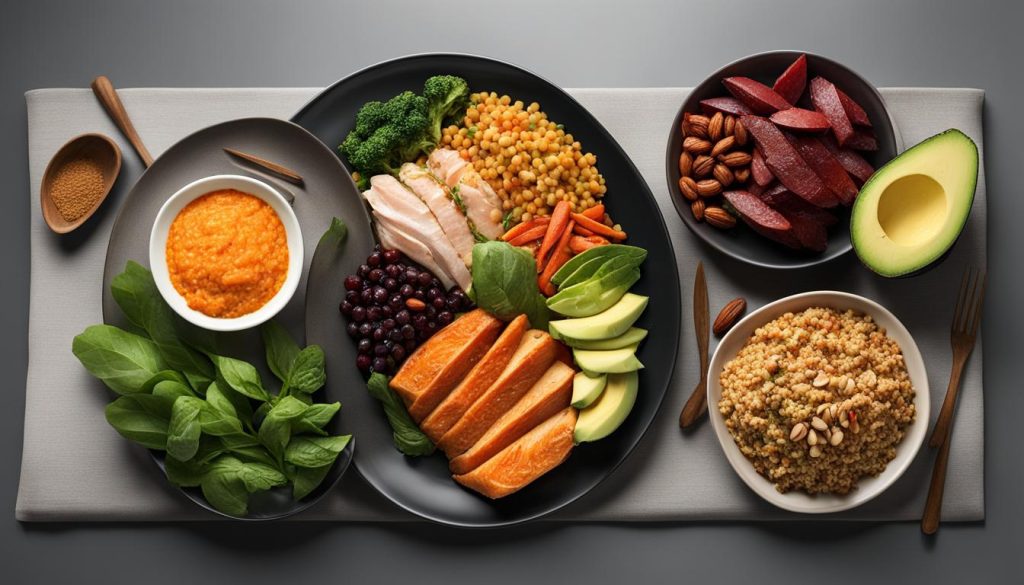
| Macronutrient | Role in Muscle Building | Main Food Sources |
|---|---|---|
| Protein | Aids in muscle repair and growth. | Lean meats, poultry, fish, dairy products, tofu, legumes. |
| Carbohydrates | Provides energy for intense workouts. | Whole grains, fruits, vegetables, quinoa, sweet potatoes. |
| Fats | Essential for hormone production and overall health. | Avocados, nuts, seeds, olive oil, fatty fish. |
Setting Your Calorie Goals for Muscle Building
When it comes to muscle building, caloric intake plays a crucial role in optimizing your gains. Finding the right balance of calories is essential to support muscle growth and achieve your desired physique. Whether you’re aiming to gain lean muscle mass or embark on a cutting phase, understanding your calorie goals is key.
For muscle gain, it’s important to consume a slight calorie surplus. This means consuming more calories than your body needs for maintenance. Generally, a surplus of around 15% above maintenance levels is recommended. This extra energy provides the fuel necessary for muscle growth and repair. By consistently maintaining a calorie surplus, you create an environment where your muscles can thrive and grow.
On the other hand, during a cutting phase, the goal is to reduce body fat while preserving lean muscle mass. In this phase, a slight calorie deficit is typically followed. A calorie deficit means consuming fewer calories than your body needs for maintenance. An ideal deficit for a cutting phase is usually around 15% below maintenance levels. This deficit helps create an energy imbalance, prompting your body to tap into its fat stores for fuel while still maintaining the muscle mass you’ve worked so hard to build.
It’s important to note that these calorie recommendations serve as general guidelines. Individual differences in metabolism, activity levels, and body composition may require adjustments to suit your specific needs. Regularly monitoring your progress and making adjustments to your calorie intake based on your weight and progression will help you fine-tune your muscle building approach.
Source: Example Source
Remember, finding the right balance of calories is crucial for muscle building. Whether you’re in a surplus or a deficit, understanding and monitoring your calorie goals will help you optimize your muscle-building journey and achieve the results you desire.
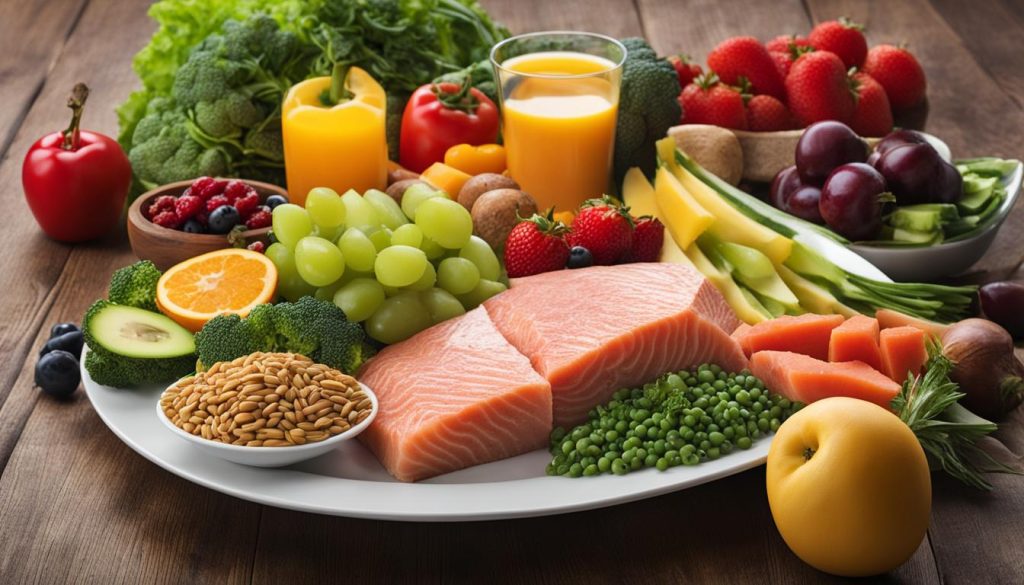
With a clear understanding of your calorie goals, you can now proceed to create a well-rounded muscle building meal plan. The next section will provide a sample meal plan featuring a variety of muscle-building foods to support your goals.
Sample Meal Plan for Muscle Building
A well-designed meal plan is a key component of a successful muscle building journey. By fueling your body with the right nutrients at the right times, you can optimize muscle growth and recovery. Here’s a sample meal plan that incorporates muscle building recipes and foods to support your goals:
Breakfast
Start your day with a hearty and protein-packed breakfast:
- Scrambled eggs with mushrooms: Whip up a delicious combination of protein and savory flavors by scrambling two eggs with a handful of mushrooms. Add a pinch of salt and pepper for taste.
- Oatmeal: Accompany your eggs with a serving of oatmeal cooked with water or milk. Mix in some fruits or nuts to add flavor and texture.
Lunch
Your midday meal should provide ample protein and healthy carbohydrates to sustain your energy levels:
- Chicken breast with white rice and lentils: Grill a boneless, skinless chicken breast and serve it with a side of cooked white rice and lentils. This combination is packed with lean protein and complex carbohydrates.
Snack
Keep yourself fueled between meals with a nutritious and satisfying snack:
- Almonds: Grab a handful of almonds, which are rich in healthy fats and provide a good source of energy.
Dinner
Your evening meal should feature a substantial serving of protein paired with nutrient-dense sides:
- Salmon with sweet potato and green beans: Bake a salmon fillet seasoned with herbs and serve it with a side of roasted sweet potato and steamed green beans. This combination offers omega-3 fatty acids, high-quality protein, and important vitamins and minerals.
Post-Workout
After a challenging workout, your body needs a protein boost to kick-start the recovery process:
- Protein shake: Mix a scoop of your favorite protein powder with water or milk to create a quick and convenient post-workout shake. This will provide your muscles with the necessary amino acids to promote repair and growth.
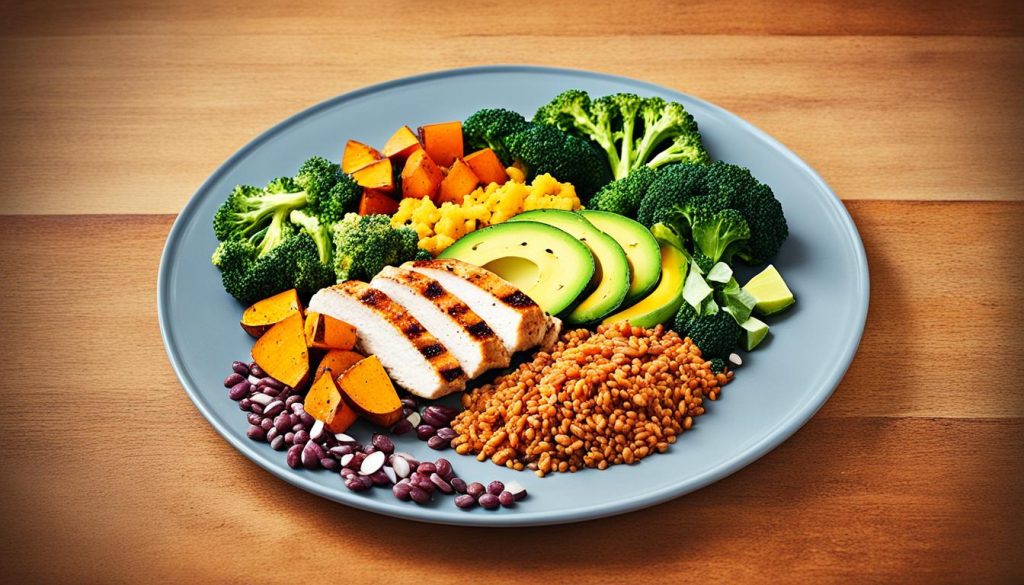
This sample meal plan serves as a guide, but you can customize it to fit your individual preferences and nutritional needs. Make sure to consider any dietary restrictions or allergies you may have when planning your meals. Remember to consult with a registered dietitian or healthcare professional to create a personalized muscle building meal plan that aligns with your goals and supports your overall well-being.
Foods to Include and Limit for Muscle Building
When it comes to building muscle, the right nutrition is key. Including nutrient-rich foods in your diet can help support muscle growth and overall health. On the other hand, it’s important to be mindful of certain foods that can hinder your muscle-building progress. Let’s take a closer look at the foods you should include and limit in your muscle building journey.
Include These Muscle Building Foods
Meats, poultry, and fish: These are excellent sources of protein, which is essential for muscle growth. Opt for lean cuts of meat, such as chicken breast and turkey, as well as fish like salmon and tuna.
Dairy products: Dairy products like milk, Greek yogurt, and cottage cheese are rich in protein and calcium, which support muscle health.
Grains: Whole grains like brown rice, quinoa, and oats provide complex carbohydrates that supply energy for intense workouts.
Fruits and vegetables: These are packed with essential vitamins, minerals, and antioxidants that promote overall health and recovery. Include a variety of colorful fruits and vegetables in your diet.
Healthy fats: Nuts, seeds, avocados, and olive oil are sources of healthy fats that are beneficial for muscle building and overall well-being.
Limit or Avoid These Foods
Alcohol: Excessive alcohol consumption can hinder muscle growth, impair recovery, and negatively impact overall performance. Limit your alcohol intake to support your muscle building goals.
Foods high in added sugars: Sugary snacks, desserts, and beverages can contribute to weight gain and negatively affect insulin sensitivity. Opt for natural sources of sweetness like fruits.
Deep-fried foods: While they may be tasty, deep-fried foods tend to be high in unhealthy fats and calories. Limit your intake of fried foods to prioritize your muscle-building progress and overall health.
By including nutrient-dense foods from various food groups and limiting foods that can hinder your progress, you can optimize your muscle building journey. Remember to make sustainable choices and consult with a healthcare professional or registered dietitian for personalized guidance.
| Foods to Include | Foods to Limit/Avoid |
|---|---|
| Meats, poultry, and fish | Alcohol |
| Dairy products | Foods high in added sugars |
| Grains | Deep-fried foods |
| Fruits and vegetables | |
| Healthy fats |
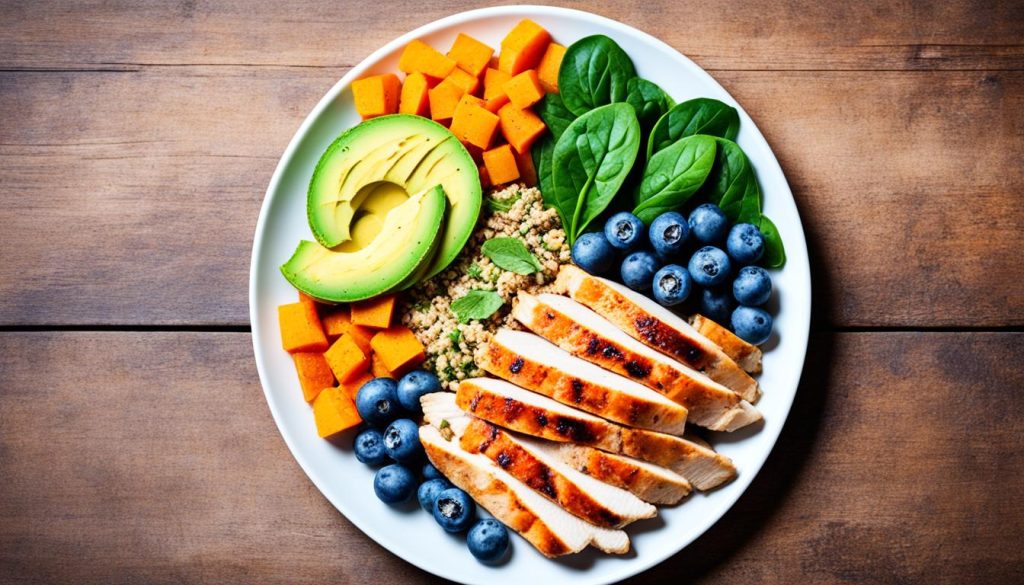
The Role of Dietary Supplements in Muscle Building
While focusing on a well-balanced diet is paramount for muscle building, incorporating dietary supplements can enhance your progress and support your muscle building goals. Supplements such as protein powders and creatine can provide additional benefits to maximize your muscle gain potential.
Protein Powders
Protein powders are a convenient way to increase your protein intake, especially for individuals who struggle to consume enough through whole foods alone. Two popular types of protein powders commonly used in muscle building are whey protein and casein protein.
Whey protein: Derived from milk, whey protein is quickly absorbed by the body, making it a great choice for post-workout recovery. It contains all the essential amino acids needed for muscle repair and growth.
Casein protein: Unlike whey protein, casein protein is digested slowly, providing a sustained release of amino acids into your system. This makes it an excellent option for promoting muscle recovery during periods of fasting, such as overnight.
Protein powders can be easily incorporated into your daily routine by adding them to shakes, smoothies, or even baked goods. They can supplement your overall protein intake and support muscle repair and growth.
Creatine
Creatine is a naturally occurring compound found in small amounts in foods like meat and fish. It is also available as a dietary supplement. Creatine is known for its ability to increase muscle strength and exercise performance, making it a popular choice among athletes and bodybuilders.
Benefits of creatine for muscle gain:
- Enhances ATP production: Creatine plays a crucial role in producing adenosine triphosphate (ATP), which is the main energy source for muscle contractions during high-intensity exercises.
- Promotes muscle hydration: Creatine draws water into your muscle cells, increasing their volume and creating an environment conducive to muscle growth.
- Boosts muscle endurance: By increasing ATP production and muscle hydration, creatine can help delay fatigue and improve your capacity to perform more repetitions or lift heavier weights.
It’s important to note that while creatine is generally safe for most people, it’s always wise to consult with a healthcare professional before adding any supplements to your routine, especially if you have any underlying health conditions.
Here is a visual representation of the role of dietary supplements in muscle building:
| Dietary Supplements | Benefits |
|---|---|
| Protein powders |
|
| Creatine |
|
By incorporating protein powders and creatine into your muscle building routine, you can enhance your progress and maximize your muscle gain potential. However, it’s crucial to remember that supplements should complement a well-rounded diet and exercise program, rather than substitute for them. Prioritizing overall health, consulting with a healthcare professional, and following recommended dosages are essential steps to ensure safe and effective use of dietary supplements for muscle building.
Benefits and Risks of Bodybuilding
When done properly, bodybuilding can offer a wide range of benefits that extend beyond just achieving a sculpted physique. Engaging in regular bodybuilding exercises, coupled with a well-balanced diet, can lead to increased muscle strength, improved body composition, enhanced heart health, and a reduced risk of chronic diseases.
By engaging in regular resistance training exercises, you can significantly increase your muscle mass and strength. This not only improves your physical performance but also enhances your ability to perform daily activities with ease. Additionally, building muscle can increase your metabolism, allowing you to burn more calories and maintain a healthy weight.
Improving your body composition is another advantage of bodybuilding. By reducing body fat and increasing muscle mass, you can achieve a leaner physique, which is aesthetically pleasing and can boost confidence levels.
Regular exercise, including bodybuilding, contributes to better heart health. It helps strengthen the heart muscle, improves circulation, and lowers blood pressure, reducing the risk of cardiovascular diseases.
Despite the many benefits, it is essential to be aware of the risks associated with bodybuilding. Extreme practices, including very low body fat levels and the use of anabolic steroids, can have negative effects on both your health and overall well-being.
Extremely low body fat levels can disrupt hormonal balance, leading to irregularities in menstrual cycles for women and decreased testosterone levels for men. Moreover, it may negatively affect sleep quality and mood stability.
Anabolic steroids, often used in bodybuilding to enhance muscle growth, can have severe health consequences. They may result in liver damage, cardiovascular problems, infertility, aggression, and mood disorders.
It is crucial to prioritize your overall health and well-being when pursuing bodybuilding goals. Seek guidance from professionals, such as registered dietitians and certified trainers, who can help you design a safe and effective fitness and nutrition plan tailored to your needs. Listening to your body, taking rest days, and practicing moderation are essential for long-term success in bodybuilding.
Incorporating bodybuilding into your lifestyle with proper guidance and a focus on overall health can yield significant physical and mental benefits. Prioritizing a balanced approach to exercise and nutrition is key to optimizing your bodybuilding journey.
Benefits of Bodybuilding:
- Increased muscle strength
- Improved body composition
- Enhanced heart health
- Reduced risk of chronic diseases
Risks of Bodybuilding:
- Disruption of hormonal balance
- Effects on sleep quality and mood stability
- Potential health consequences of anabolic steroid use
By understanding the benefits and risks associated with bodybuilding, you can make informed decisions that align with your health and fitness goals.
Conclusion
Optimizing your muscle gains and achieving your desired muscle growth requires a well-planned muscle building diet. By focusing on a balanced intake of macronutrients, including protein, carbohydrates, and fats, you can support your muscle building goals effectively. Incorporating muscle building foods that are high in protein, such as eggs, chicken breast, and Greek yogurt, will provide the necessary nutrients for muscle repair and growth.
Personalizing your muscle building diet based on your individual needs is essential. Monitoring your calorie intake, whether it’s maintaining a slight surplus for muscle gain or creating a slight deficit for a cutting phase, will ensure that you’re fueling your body with the right amount of energy. Additionally, considering dietary supplements like protein powders or creatine can be beneficial, but it’s important to consult with a healthcare professional before adding any supplements to your routine.
Remember, prioritizing your overall health is crucial throughout your muscle building journey. Seeking professional guidance, especially if you’re new to bodybuilding, will help you navigate the process effectively and avoid any potential risks. By following a well-balanced muscle building diet and staying consistent with your exercise routine, you can optimize your gains and achieve the muscle growth you desire.
FAQ
What is a muscle building diet?
A muscle building diet is a well-balanced eating plan that includes foods high in protein, moderate in carbohydrates and fats, and rich in essential nutrients. It provides the necessary nutrients, energy, and building blocks for muscle growth and repair.
What are the best muscle building foods?
Some of the best muscle building foods include eggs, salmon, chicken breast, Greek yogurt, tuna, lean beef, shrimp, soybeans, cottage cheese, and turkey breast. These foods are high in protein and also contain other important nutrients like vitamins and minerals that support muscle health.
What is the role of macronutrients in muscle building?
Macronutrients, such as protein, carbohydrates, and fats, play key roles in muscle building. Protein is important for muscle repair and growth, while carbohydrates provide energy for intense workouts. Fats are essential for hormone production and overall health.
How many calories should I consume for muscle building?
To gain lean muscle mass, it is important to consume a slight calorie surplus, usually around 15% above maintenance levels. This surplus provides the extra energy needed for muscle growth. Conversely, during a cutting phase to reduce body fat while maintaining muscle mass, a slight calorie deficit, typically around 15% below maintenance levels, is recommended.
Can you provide a sample meal plan for muscle building?
A sample meal plan for muscle building can include a variety of foods from different food groups. Examples of meals include scrambled eggs with mushrooms and oatmeal for breakfast, chicken breast with white rice and lentils for lunch, almonds as a snack, salmon with sweet potato and green beans for dinner, and a post-workout protein shake.
What foods should I include and limit for muscle building?
When following a muscle building diet, it is important to include nutrient-rich foods from various food groups such as meats, poultry, and fish for protein, dairy products for calcium and protein, grains for carbohydrates, fruits and vegetables for essential vitamins and minerals, and healthy fats from sources like nuts and seeds. On the other hand, it is important to limit or avoid alcohol, foods high in added sugars, and deep-fried foods, as they can hinder muscle growth and overall health.
Are dietary supplements necessary for muscle building?
While a well-balanced diet should be the primary focus, dietary supplements can be beneficial for supporting muscle building goals. Protein powders, such as whey and casein, can help increase protein intake, especially for those who struggle to consume enough through whole foods. Creatine is another popular supplement that can enhance muscle strength and endurance. It is important to consult with a healthcare professional before adding any supplements to your routine.
What are the benefits and risks of bodybuilding?
Bodybuilding, when done properly, can have numerous benefits, including increased muscle strength, improved body composition, enhanced heart health, and reduced risk of chronic diseases. However, extreme practices, such as very low body fat levels and the use of anabolic steroids, can have negative effects on sleep, mood, and overall health. It is important to prioritize overall health and seek guidance from professionals when pursuing bodybuilding goals.
How can a muscle building diet optimize gains?
A muscle building diet is essential for optimizing gains and achieving desired muscle growth. By focusing on a balanced intake of macronutrients, including protein, carbohydrates, and fats, and incorporating muscle building foods, individuals can support their muscle building goals. It is important to personalize the diet based on individual needs, monitor calorie intake, and consider dietary supplements if necessary. Additionally, it is crucial to prioritize overall health and seek professional guidance when pursuing bodybuilding goals.
Can a Keto Diet also Help with Muscle Building?
Yes, a beginner’s guide to keto diet can also help with muscle building. While the keto diet is known for its fat-burning benefits, it can also be effective for preserving and building muscle mass. By consuming enough protein and engaging in resistance training, individuals can see improvements in muscle strength and size while on a keto diet.


